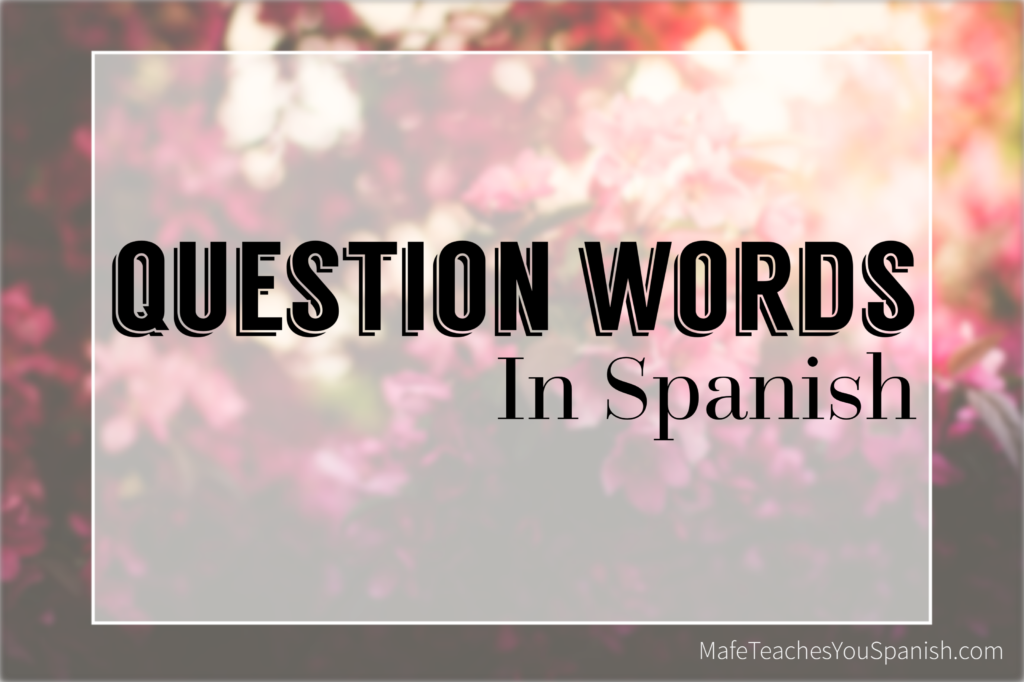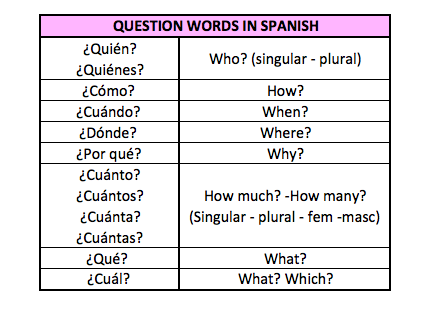
Question words in Spanish are exactly what it sounds. Words to ask questions in Spanish.
Questions like: what? where? when? how? who? why? etc.
THESE ARE THE QUESTION WORDS YOU NEED TO LEARN
AND THIS IS HOW YOU WILL USE THEM
¿Quién? (Who?)
1. SINGULAR
- ¿Quién es tu profesora? (Who is your teacher?)
- ¿Quién es ella? (Who is she?)
- ¿Quién va a venir a la fiesta? (Who is going to come to the party?)
2. PLURAL
- ¿Quiénes son tus profesores? (Who are your teachers?)
- ¿Quiénes son ellas? (Who are they?)
3. With prepositions
When you ask: Who do you live with?
Or
Who are you talking to?
We use the prepositions, but we place them at the beginning of the question:
- Who do you live with?
with: con
- ¿Con quién vives?
and
- who are you talking to?
to: a
- ¿A quién le estás hablando?
Note 1:
In Spanish it’s common to say that we talk with people, not to people, so we use the preposition con.
It’s very common to say in Spanish:
- ¿Con quién estás hablando? (who are you talking with?)
Estoy hablando con mi hermana (I’m talking with my sister)
Note 2:
Whose –> De quién
- ¿De quién es esta casa? (Whose house is this?)
- ¿De quién es este carro? (Whose car is this?)
- ¿De quién son estos perros? (Whose dogs are these?)

¿Cómo? (How?)
- ¿Cómo estás? (How are you?)
- ¿Cómo podemos ir al concierto? (How can we go to the concert)
- ¿Cómo aprender español? (How to learn Spanish?)
In general any How to… question uses
¿Cómo + verb in infinitive + complement ?
- ¿Cómo construir una casa? How to build a house
- ¿Cómo aprender español? How to learn Spanish?
- ¿Cómo viajar por Colombia? How to travel around Colombia
Note:
¿Cómo…? does not work for asking How many/How much. We have different question words for those. Keep reading.
¿Cuándo? (When?)
- ¿Cuándo es la fiesta? (When is the party?)
- ¿Cuándo es tú cumpleaños? (When is your birthday?)
- ¿Cuándo vas a viajar? (When are you going to travel?)
This one is very easy, right?
¿Dónde? (Where?)
- ¿Dónde está el gato casa? (Where is the cat?)
- ¿Dónde está María? (Where is María?)
- ¿Dónde están tus padres? (Where are your parents?)
With prepositions:
- Where are you going (to)? (¿A dónde vas?)
- Where are you from? (¿De dónde eres?)
- Where are you (at)? (¿En dónde estás?)

¿Por qué? (Why?)
- ¿Por qué estás cansado? (Why are you tired?)
- ¿Por qué hiciste eso? (Why did you do that?)
- ¿Por qué te fuiste de la fiesta? (Why did you leave the party?)
To answer Why questions use Porque (because)
- ¿Por qué estás cansado?
Porque estaba haciendo ejercicio (Because I was working out)
- ¿Por qué te fuiste de la fiesta?
Porque estaba cansada (Because I was tired)
¿Cuánto? ¿Cuántos?¿Cuánta? ¿Cuántas?
(How much? How many?)
We only have one word for how much and how many, but have 4 versions of that word depending on gender and quantity:
1. ¿Cuánto? Singular, masculine or impersonal
- ¿Cuánto dinero tienes? How much money do you have?
- ¿Cuánto queso quieres? How much cheese do you want?
- ¿Cuánto comiste? How much did you eat?
- ¿Cuánto cuesta el vestido? How much does the dress cost?
So, to ask for the price of singular objects use the standard question:
¿Cuánto cuesta + noun?
- ¿Cuánto cuesta la casa?
- ¿Cuánto cuesta el carro?
- ¿Cuánto cuesta la leche?
- ¿Cuánto cuesta el libro?
And to ask for the price of many objects (plural):
¿Cuánto cuestan + noun?
- ¿Cuánto cuestan las flores?
- ¿Cuánto cuesta los zapatos?
- ¿Cuánto cuesta las sillas?
- ¿Cuánto cuestan los chocolates?
The object’s gender and quantity (flores, casa, carro) can vary and alter the verb costar (cuesta, cuestan), but the question ¿Cuánto? hasn’t changed because we are still talking about money (dinero)

2. ¿Cuántos? Plural, masculine
- ¿Cuántos hombres estudian aquí? (How many men study here)
- ¿Cuántos vestidos quieres comprar? (How many dresses do you want to buy?)
- ¿Cuántos años tienes? (How many years do you have? or the equivalent to “how old are you?”)
3. ¿Cuánta? Singular, feminine
- ¿Cuánta agua has bebido hoy? (How much water have you drank today?)
- ¿Cuánta comida necesitas para la fiesta? (How much food do you need for the party?)
4. ¿Cuántas? Plural, feminine
- ¿Cuántas mujeres estudian aquí? (How many women study here?)
- ¿Cuántas personas has conocido? (How many people have you met?)
Notice a pattern?
Usually the plural ¿Cuántos? ¿Cuántas? means How many?
and the singular ¿Cuánto? ¿Cuánta? means How much?
¿Qué? (What?)
¿Cuál? (What? Which?)
I left these 2 for the end on purpose, because they are usually the most confusing ones, since What? can mean ¿Qué? and ¿Cuál? But I am going to explain the difference between them in a very simple way:
- ¿Qué?
¿Qué? is used when we ask a question that has only one possible straight answer. If we are asking for a definition, fact or information:
- ¿Qué es eso? (What is that?)
- ¿Qué significa la palabra carro? What does the word carro mean?
- ¿Qué estás haciendo? What are you doing?
- ¿Qué es un elefante? What is an elephant?
- ¿Qué es la biologia? What is biology?
- ¿Cúal?
¿Cúal? is used when we ask a question where the answer needs to make a selection from a set of choices, or if you are asking for personal information:
- ¿Cúal es tu color favorito? (What is your favorite color?) (you have many choices)
- ¿Cúal es tu equipo favorito? (What is your favorite team?)
- ¿Cúal es tu deporte favorito? (What is your favorite sport?)
- ¿Cúal es tu edad? (What’s your age?)*
¿Cúal? Also means which one
- ¿Cúal es tu carro? Which one is you car?
- ¿Cúal quieres? Which one do you want?
- ¿Cúal prefieres? Which one do you prefer?
*It is more common to ask “¿Cuántos años tienes?”
Take a lesson about QUESTION WORDS IN SPANISH
Having trouble understanding the use of these words? Would you like to practice them in real life?
Send me a message to book a lesson now and I will help you to understand, practice and use these question words and more.
